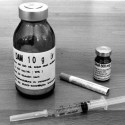1 in 8 combat troops needs alcohol counseling
One in eight troops returning from Iraq and Afghanistan from 2006 to 2008 were referred for counseling for alcohol problems after their post-deployment health assessments, according to data from the Armed Forces Health Surveillance Center.
Service members complete their initial health assessments within 30 days of returning home.
The authors of the study, published in the Medical Surveillance Monthly Report, compared numbers of active-duty service members who had an alcohol-related medical encounter with those who received counseling for alcohol, noting that studies have shown troops with post-traumatic stress disorder are more likely to be substance abusers.
Defense officials said they are aware of the data. “Substance misuse/abuse is a psychological health issue, and thus one we are actively involved with,” said Navy Capt. Edward Simmer, Senior Executive Director for Psychological Health Defense Centers of Excellence for Psychological Health.
In recent years, a number of soldiers and Marines have been discharged because of a “pattern of misconduct” stemming from alcohol abuse. Earlier this month, Army Vice Chief of Staff Gen. Peter Chiarelli ordered military leaders to do a better job of getting treatment for soldiers or discharging offenders if they have received help and still have problems.
In an internal memo, Chiarelli wrote that “a growing population” of soldiers with substance abuse problems — identified either through urine tests or through “alcohol-related actions” — have not been referred to the Army Substance Abuse Program by their commanders.
Joyce Raezer, executive director of the National Military Family Association, sees a deeper issue.
Troops “fear seeking help, so they self-medicate,” she said. “You’ve got competing stigmas going on here.”
In other words, troops may use alcohol to numb themselves from thinking about friends they’ve lost or people they’ve shot because they’re afraid to seek mental health counseling. But they also don’t seek help for the alcohol issues because, again, they’re afraid doing so might hurt their careers.
Simmer said the military is testing two new policies to address the problem. In one, a service member’s command will not automatically be notified if the member seeks treatment. Simmer said the hope is that this will lead more people to seek treatment.
In a second pilot program, if a service member screens positive for alcohol issues on a post-deployment health assessment but is not referred for counseling by a health care provider, the provider must document why.
“It’s quite possible that when the provider talks with the member, the provider finds, very appropriately, that a referral is not clinically indicated,” Simmer said. “By having this documented on the form, however, we will be able to track these reasons and make better-informed decisions to increase the number who receive needed interventions for alcohol use.”
Simmer said identifying an alcohol problem also could help military doctors dig up combat-stress issues, so each person who comes in on an alcohol referral is also screened for PTSD.
According to the new report, 61 percent of soldiers who receive an alcohol-related diagnosis are treated within a year.
Only 42 percent of Marines and 59 percent of sailors receive treatment within a year. For airmen, 63 percent receive treatment within a year.
The report said further research is needed to see whether troops referred for alcohol problems after deployment get appropriate counseling and treatment.
When service members return from Iraq or Afghanistan, where they are not allowed alcohol, they are briefed about the dangers of using alcohol to deal with stress. However, younger service members often celebrate their return home with a boozy night out at the bars — and for many, the practice lingers.
Researchers found that 65,269 service members — including those who hadn’t deployed — had at least one alcohol-related medical encounter over the three years studied, and 7,188 people had at least one acute alcohol-related hospitalization. Of those with medical encounters, 50,296 were in paygrades E-4 and below, 6,526 were female and 31,320 were ages 21 to 24.
“The services should target alcohol and other substance-abuse programs to the youngest and most junior female members — beginning in recruit training,” the report states.
For all active-duty service members — including those who haven’t deployed to Iraq or Afghanistan — the Army still had the highest rate of medical encounters, with about one out of 44 soldiers with an alcohol-related clinic or hospital visit.
The figures were one out of 115 for the Air Force; one out of 60 for the Marine Corps; and one out of 77 for the Navy. About one in 150 service members had three or more acute alcohol diagnoses separated by at least 30 days.
People who have a medical encounter for alcohol use before they deploy are 2.5 times more likely to mark at least one item on their post-deployment screening for alcohol issues.
Researchers speculated that because a person is unlikely to succeed in the military if they have an alcohol problem, older officers and enlisted troops may be avoiding counseling.
“In turn, prevalences and rates of alcohol and other substance-abuse problems are likely underestimated from diagnoses and procedures documented on standard medical records — more so among officers and senior enlisted members than other military members,” the report states.
source: Military Times
